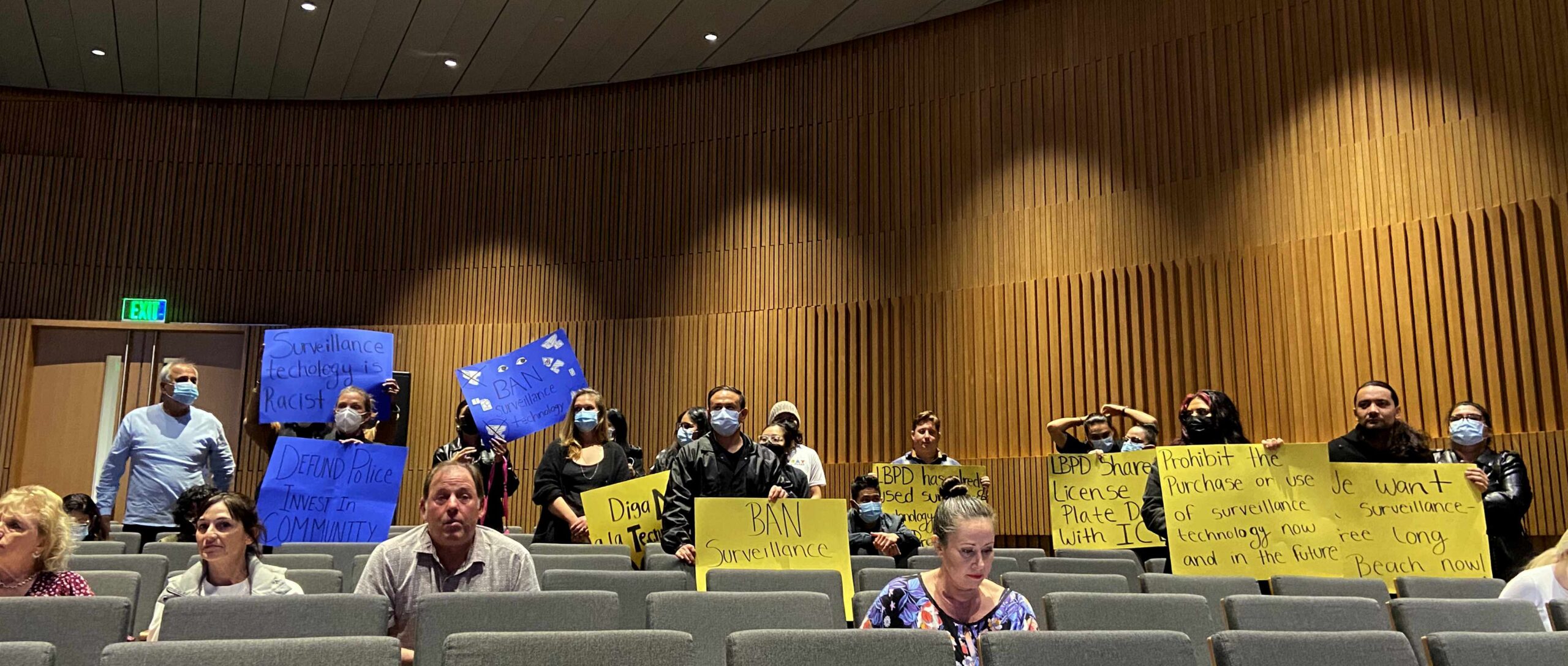Long Beach City Council Dismisses Public Demand to Curb Surveillance Network Expansion
by Shay Sharan | Published February 9, 2023 in Journalism
5 minute readThe Long Beach City Council on Tuesday unanimously approved the police department’s request for a $1.2 million expansion of automatic license plate readers (ALPR), despite demands from dozens of residents and community organizers to ban the use of this mass surveillance technology.
A spokesperson for the LBPD said the department plans to expand their surveillance network by purchasing 34 vehicle-mounted ALPR camera systems for patrol cars, four trailers with ALPR camera systems and four trailer-lifting kits. The last time the city purchased these devices was in 2020, when the council approved 17 ALPRs for the Parking Enforcement Division with a price tag of nearly $400,000.
ALPRs are a system of cameras mounted to law enforcement vehicles and street poles that scan the license plates of passing cars. This technology allows police to quickly amass and store vast amounts of information about residents’ travel patterns and other intimate details of their lives. In 2019 alone, the Beachcomber reported that the LBPD scanned over 24 million plates—that’s about 68,000 scans a day.
Those who came to the council chambers to provide public comment implored lawmakers to take seriously the potential for further police misuse of an expanding surveillance network with a history of racial bias and civil rights violations; there were no public comments in support of approving the purchase. In fact, the risk of police misuse of these devices led to the city’s own Equity and Humans Relations Commission (EHRC) recommending a ban on the use of ALPRs.
In defense of this controversial decision, District Eight Councilmember Al Austin said Long Beach has “a problem with crime,” and insisted that ALPRs help solve them. Austin went on to imply that resisting police surveillance is a futile act.
“We’re always being tracked,” Austin said as he held up his cell phone. “You can’t commit a crime and get away with it without some form of technology catching up with you.”
However, according to police records obtained by attorney Greg Buhl, who runs local police transparency website CheckLBPD.org, 99.93% of the license plate data collected that year was on law-abiding drivers. These figures seriously challenge the validity of the idea that Long Beach’s privacy is a small price to pay for the crime-fighting benefits of using ALPRs, especially considering the risks it poses to immigrant communities and the LBPD’s history of misuse.
Sixth District Councilmember Suely Saro notably did not actively participate in council deliberation before voting in favor of expanding the police surveillance network in Long Beach. Saro told FORTHE in 2020, when a candidate for City Council, that “surveillance is antithetical to a free society, and we should be very skeptical of attempts to implement mass surveillance schemes. Our default position on these technologies should be that they should not be used.”
In an attempt to assuage the concerns raised by community members about a lack of police accountability and oversight, Austin and other city officials candidly acknowledged the need to protect the civil liberties of Long Beach residents by ensuring proper checks on police power. Austin applauded the City Council for taking “progressive steps to reform our civilian oversight policies” saying that he thinks they are “headed in the right direction.”
After the Movement for Black Lives in 2020 put pressure on municipalities to increase police oversight, the city’s Racial Reconciliation and Equity Initiative tasked city staff with reforming of the Citizen Police Complaint Commission (CPCC)—the chartered commission that is ostensibly responsible for providing “independent, impartial, and objective civilian oversight” of the police department. Consultants from Polis Solutions & Change-Integration were awarded a contract to provide the city with advice on how to improve the Commission’s ability to hold police responsible for their actions. In their evaluation, they said prior to instituting any new policies, the Commission did not “meet the City’s or the community’s calls for increased transparency, accountability, and input on addressing broader organizational culture issues within the Long Beach Police Department.”
However, even after attempts to move toward creating a more efficacious oversight body, Ninth District CPCC Commissioner Brent Walmsley said the mechanisms for increased accountability remained unclear. In a public hearing in December 2021, moments before the CPCC officially approved the consultants’ recommendations, he raised concerns about the persistent problem of the opaque nature of LBPD’s Internal Affairs division and the Human Resources policies that constrain the Commission’s ability to get complete information for their investigations.
“People look at us and say ‘you’re holding the police accountable,’ but then from what I’ve seen, it very rarely happens,” he said. I’ve been on this [commission] for a year and just about every time, the City Manager has overridden what we’ve recommended…so I mean I feel like Sisyphus rolling a rock up a hill.”
Despite looming concerns about the result of the City Council’s vote to approve the purchase of more surveillance gear, Long Beach Immigrant Rights Coalition Senior Organizer Jamilet Ochoa acknowledged the growing momentum of the anti-surveillance movement in Long Beach.
“The Anti-Surveillance Coalition started with only five people showing up to City Council meetings. Shit, it was one person before [that]. But we’re here. There’s 23 of us that made a public comment today,” Ochoa said. “We’re gonna keep coming back, asking questions, demanding that this surveillance technology is banned. Not reformed, we want it gone. We want it out of our city.”
Tomisin Oluwole
Coquette
Acrylic on canvas
18 x 24 inches
Click here to check out our interview with Tomisin Oluwole, a a literary and visual artist based in Long Beach.

Instead of gunking up our site with ads, we use this space to display and promote the work of local artists.
Help Us Create An Independent Media Platform for Long Beach
We believe that what we are trying to do here is not only unique, but constitutes a valuable community resource. We are dedicated to building a fiercely independent, not-for-profit, and non-hierarchical media organization that serves Long Beach. Our hope is that such a publication will increase civic participation, offer a platform to marginalized voices, provide in-depth coverage of our vibrant art scene, and expose injustices and corruption through impactful investigations. Mainly, we plan to continue to tell the truth, and have fun doing it. We know all this sounds ambitious, but we’re on our way there and making progress every day.
Here’s what we don’t believe in: our dominant local media being owned by one of the city’s wealthiest moguls or a far-flung hedge fund. We believe journalism must be skeptical and provide oversight. To do so, a publication should remain free from financial conflicts of interest. That means no sugar daddy or mama for us, but also no advertisements. We answer to no one except to our readers.
We call ourselves grassroots media not only because we are committed to producing work that is responsive to you, dear reader, but because in order for this project to continue we will also need your support. If you believe in our mission, please consider becoming a monthly donor—even a small amount helps!


 shay@forthe.org
shay@forthe.org




